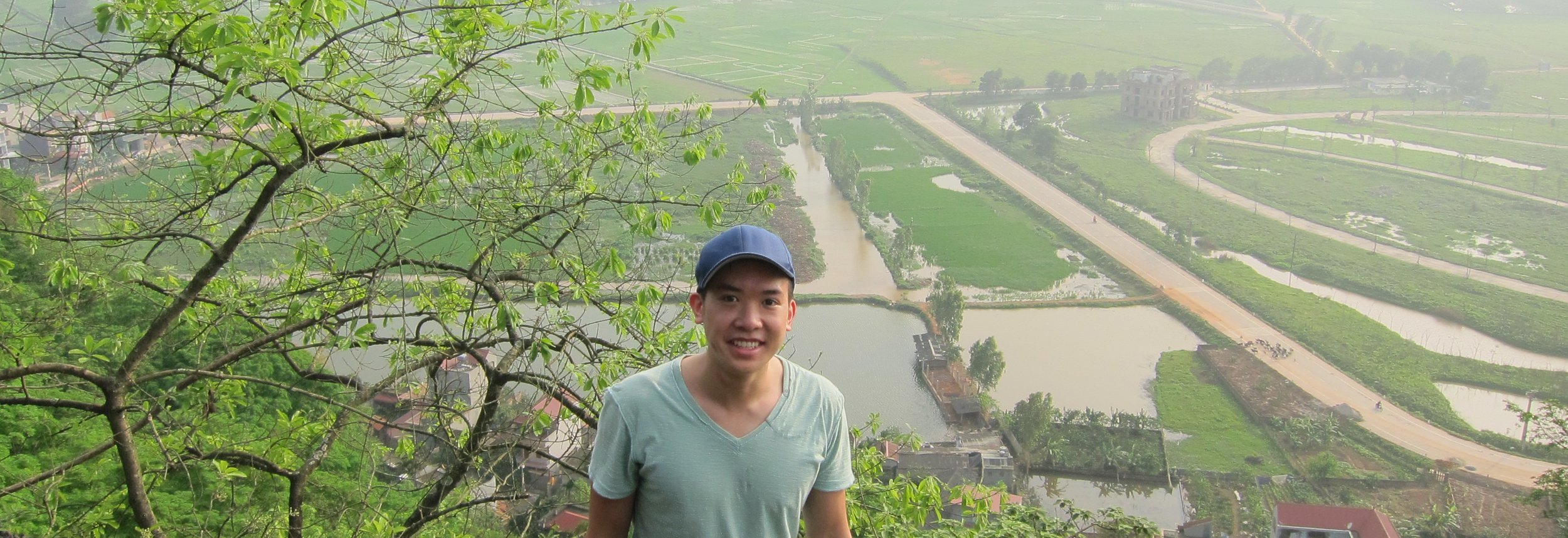Written by Vivienne Steele and Carlee WrightOn December 5th, our lab went to Play with Clay to make hand-crafted mugs! With guidance from staff we learned to roll and cut shapes from fresh clay, and everyone decorated their mugs with fun stamps, lace, and stencils. After painting and glazing, they were fired in the kiln and ready for use! This event was rewarding and relaxing after everyone's busy semesters - a chance to create unique pottery pieces in wonderful company.
Community-based Research Update: Nia & Kate in Uganda
Written by Nia King, Research Associate About two weeks ago I arrived in Uganda to work as a research assistant alongside Kate Patterson (PhD candidate), investigating rural maternal health and working to develop a knowledge translation strategy for IHACC Uganda. We are staying at the Monkey House, and have been joined by a wide variety of interesting visitors, including a group of external hospital auditors, tropical health students from the London School of Tropical Health and Medicine, two Americans who have spent the past two years driving in a camper van across Africa, and Dr. Kellerman, founder of Bwindi Community Hospital. This has made for a very lively and fun living environment!
With the quantitative maternal health surveys having been completed this past summer, we are now working with local research associates Seba, Charity, and Grace to conduct qualitative focus group discussions and individual interviews with mothers and fathers in Batwa and Bakiga communities throughout the Kanungu District. As the primary focus of Kate’s research is Indigenous maternal health, we are conducting repeated weekly focus group discussions with women in three Batwa settlements, chosen to capture the variety in geographies and access to healthcare. By spending approximately six hours discussing with each group of women, we are starting to capture and understand many of the nuances related to maternal health in rural Uganda. In addition to these focus groups, we have conducted focus group discussions with Batwa men and Bakiga (non-Indigenous) women. Kate has also been working with 9 Batwa women conducting repeated individual interviews to gather personal narratives surrounding maternal health. Through these various engagements, we have met many amazing women throughout the past couple weeks and look forward to providing them with a platform to voice their challenges and concerns. Our findings are intended to inform maternal health programs and delivery at the Bwindi Community Hospital and surrounding healthcare facilities.
When not in the communities, we have had the opportunity to partake in several hikes, including one that leads to a ridge overlooking the Ugandan and Democratic Republic of Congo border. Kate was also amazing and arranged a birthday party (including a homemade banana-nutella cake) for me last week, which made spending my birthday away from home extra special.
Overall our work is progressing smoothly here. I am so lucky to have the opportunity to live in this amazing part of the world and to learn from all of Kate’s experience. I look forward to the next two weeks—the time here is flying and pretty soon I’ll be hopping on a plane back home!
Congratulations to Steven Lam!
Congratulations to Lindsay Day!
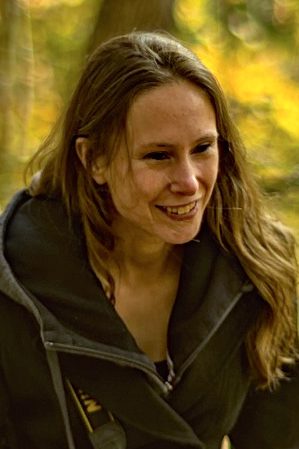 Sincerest congratulations to Lindsay Day, as she begins her new job at the Gordon Foundation, as a Program Coordinator for the MacKenzie DataStream. The Gordon Foundation is "a charitable organization dedicated to protecting Canada's water and empowering Canada's North. [They] seek opportunities to amplify underrepresented voices, elevate emerging issues, and collaborate with like-minded organizations to drive powerful, sustainable outcomes."
Lindsay completed a MSc in the Department of Population Medicine. Her thesis and Water Dialogues podcast examined reconciling our relationships with water, through the development and use of a collaborative podcasting methodology to explore and share diverse First Nations, Inuit, and Métis Perspectives.
Sincerest congratulations to Lindsay Day, as she begins her new job at the Gordon Foundation, as a Program Coordinator for the MacKenzie DataStream. The Gordon Foundation is "a charitable organization dedicated to protecting Canada's water and empowering Canada's North. [They] seek opportunities to amplify underrepresented voices, elevate emerging issues, and collaborate with like-minded organizations to drive powerful, sustainable outcomes."
Lindsay completed a MSc in the Department of Population Medicine. Her thesis and Water Dialogues podcast examined reconciling our relationships with water, through the development and use of a collaborative podcasting methodology to explore and share diverse First Nations, Inuit, and Métis Perspectives.
Congratulations Lindsay!
Photos of Lindsay's Research
Canadian and Australian perspectives on promising practices for integrative Indigenous and Western knowledge systems
Congratulations to first-author Rob Stefanelli, from Heather Castleden's HEC Lab, on his publication that examines Canadian and Australian researchers' perspectives on promising practices for implementing indigenous and Western knowledge systems in water research and management.
Citation:
Stefanelli, R., Castleden, H., Cunsolo, A., Martin, D., Harper, S.L. and Hart, C., 2017. Canadian and Australian researchers' perspectives on promising practices for implementing indigenous and Western knowledge systems in water research and management. Water Policy, DOI: 10.2166/wp.2017.181. Click here to access the article.
Abstract:
National and international policies have called for the inclusion of Indigenous peoples and the uptake of Indigenous knowledge alongside Western knowledge in natural resource management. Such policy decisions have led to a recent proliferation of research projects seeking to apply both Indigenous and Western knowledge in water research and management. While these policies require people with knowledge from both Western and Indigenous perspectives to collaborate and share knowledge, how best to create and foster these partnerships is less understood. To elicit this understanding, 17 semi-structured interviews were completed with academic researchers from Canada and Australia who conduct integrative water research. Participants, most of whom were non-Indigenous, were asked to expand on their experiences in conducting integrative water research projects, and findings were thematically analyzed. Our findings suggest that Indigenous and Western knowledge systems influence how one relates to water, and that partnerships require a recognition and acceptance of these differences. We learned that community-based participatory research approaches, and the associated tenets of fostering mutual trust and community ownership for such an approach, are integral to the meaningful engagement that is essential for developing collaborative partnerships to implement both Indigenous and Western knowledge systems and better care for water.
New Publication! Water quality and health in northern Canada
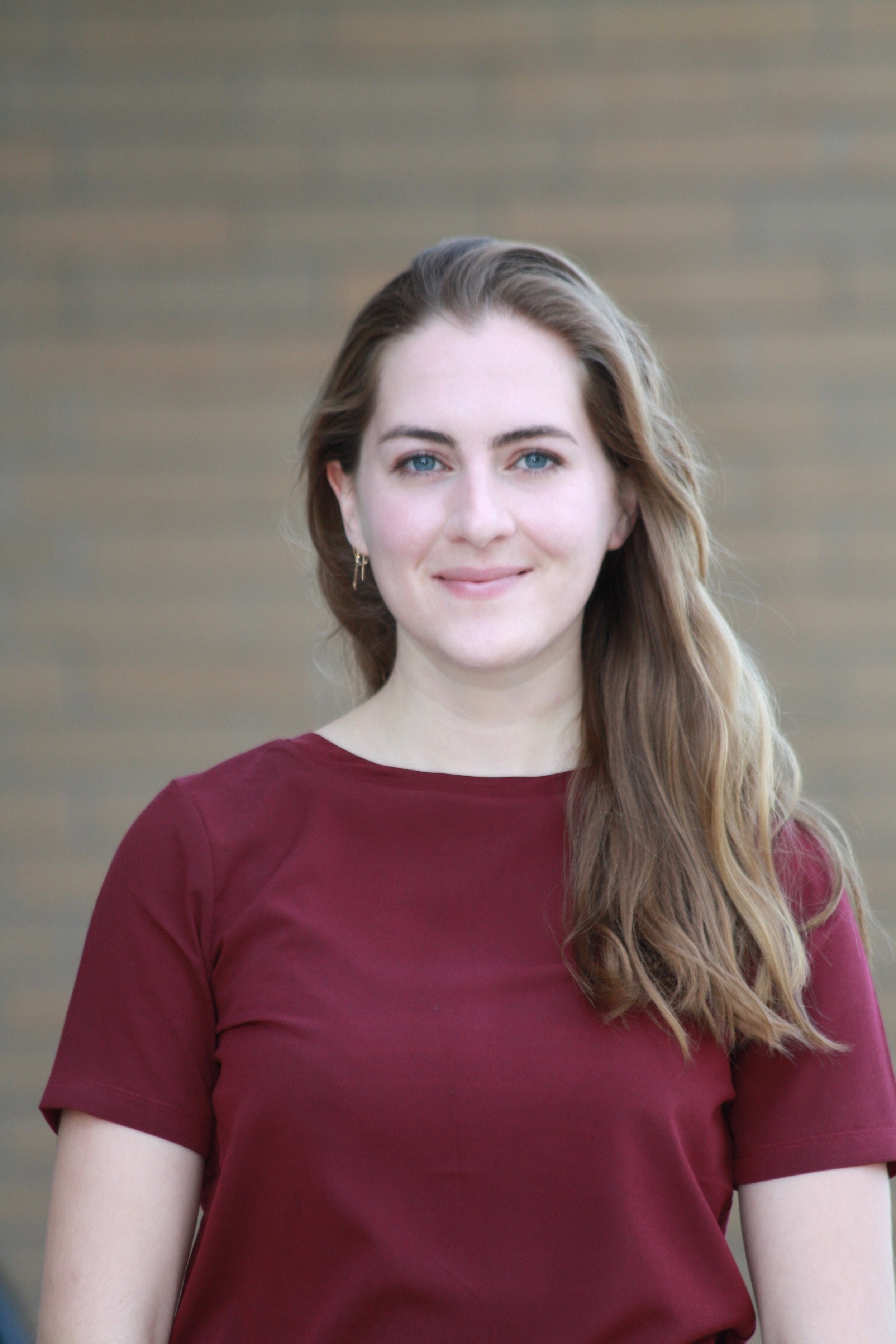 Congratulations to Carlee Wright on her first first-author publication! Carlee worked with the Rigolet Inuit Community Government to examine potential associations between stored drinking water and acute gastrointestinal illness in Labrador Inuit.
Citation: Wright, C.J., Sargeant, J.M., Edge, V.L., Ford, J.D., Farahbakhsh, K., Shiwak, I., Flowers, C., IHACC Research Team, and Harper, S.L. (2017). Water quality and health in northern Canada: stored drinking water and acute gastrointestinal illness in Labrador Inuit. Environmental Science and Pollution Research, DOI: 10.1007/s11356-017-9695-9. Click here to access the article.
Congratulations to Carlee Wright on her first first-author publication! Carlee worked with the Rigolet Inuit Community Government to examine potential associations between stored drinking water and acute gastrointestinal illness in Labrador Inuit.
Citation: Wright, C.J., Sargeant, J.M., Edge, V.L., Ford, J.D., Farahbakhsh, K., Shiwak, I., Flowers, C., IHACC Research Team, and Harper, S.L. (2017). Water quality and health in northern Canada: stored drinking water and acute gastrointestinal illness in Labrador Inuit. Environmental Science and Pollution Research, DOI: 10.1007/s11356-017-9695-9. Click here to access the article.
Abstract: One of the highest self-reported incidence rates of acute gastrointestinal illness (AGI) in the global peer-reviewed literature occurs in Inuit communities in the Canadian Arctic. This high incidence of illness could be due, in part, to the consumption of contaminated water, as many northern communities face challenges related to the quality of municipal drinking water. Furthermore, many Inuit store drinking water in containers in the home, which could increase the risk of contamination between source and point-of-use (i.e., water recontamination during storage). To examine this risk, this research characterized drinking water collection and storage practices, identified potential risk factors for water contamination between source and point-of-use, and examined possible associations between drinking water contamination and self-reported AGI in the Inuit community of Rigolet, Canada. The study included a cross-sectional census survey that captured data on types of drinking water used, household practices related to drinking water (e.g., how it was collected and stored), physical characteristics of water storage containers, and self-reported AGI. Additionally, water samples were collected from all identified drinking water containers in homes and analyzed for presence of Escherichia coli and total coliforms. Despite municipally treated tap water being available in all homes, 77.6% of households had alternative sources of drinking water stored in containers, and of these containers, 25.2% tested positive for total coliforms. The use of transfer devices and water dippers (i.e., smaller bowls or measuring cups) for the collection and retrieval of water from containers were both significantly associated with increased odds of total coliform presence in stored water (ORtransfer device = 3.4, 95% CI 1.2–11.7; ORdipper = 13.4, 95% CI 3.8–47.1). Twenty-eight-day period prevalence of self-reported AGI during the month before the survey was 17.2% (95% CI 13.0–22.5), which yielded an annual incidence rate of 2.4 cases per person per year (95% CI 1.8–3.1); no water-related risk factors were significantly associated with AGI. Considering the high prevalence of, and risk factors associated with, indicator bacteria in drinking water stored in containers, potential exposure to waterborne pathogens may be minimized through interventions at the household level.
Photos of Carlee's Research
Indigenous Maternal Health Research in Uganda
Written by Julia Bryson, Undergraduate Researcher PhD Candidate Kate Patterson and Research Assistants Julia Bryson, Mackenzie Wilson, and Emma Windfeld, along with two core IHACC students Grace Asaasira and Phiny Smith of Makerere University, have been working in Uganda researching maternal health among Indigenous and non-Indigenous communities in Kanungu District. Here is an update on their work and adventures!
It is hard for us to believe, but we have officially completed our work in the communities of Kanungu District and are back in Kampala! It seems like it was just yesterday that we arrived in beautiful Buhoma. We will miss its rolling green hills, and even the mischievous monkeys that frequented the appropriately-named Monkey House we called home.
The past few weeks have been busy as we approached the end of our time in Buhoma—finishing data collection, sharing preliminary findings with our local partners, and saying many, many goodbyes to all the amazing people we have worked and lived with for the past six weeks. In total, we visited twenty communities over five weeks and surveyed approximately 600 women about their maternal health histories. Mackenzie and Julia also conducted sixteen focus group interviews to learn more about maternal nutrition and antenatal care in the area, and Emma spoke with several groups of community members about climate and food security associations.
The weekend before our departure, we took the opportunity to celebrate our amazing team of local surveyors, including students from our partner Makerere University, with some delicious local food and dancing. None of our work would have been possible without their time, effort, and enthusiasm!
We were also excited to have the opportunity to share about our research with one of our key partners in Buhoma, Bwindi Community Hospital (BCH). We presented our research methods and preliminary findings with over thirty BCH health care workers and administrators and had fruitful discussions about future steps as we work together to use the information we have gathered to improve health in the area. The knowledge and expertise of our BCH partners is integral to the success of our work, and we are so grateful to be able to collaborate with them and continue to build these important relationships throughout the project.
The drive back to Kampala was lengthy, but full of adventure! We drove through the gorgeous Queen Elizabeth National Park and were lucky enough to spot one of the elusive tree-climbing lions, thanks to the sharp eye of our driver, Maddy. We also saw antelopes, baboons, monkeys, buffalo, and even elephants! An unexpected safari on the way to the city was a great way to cap off our time in the south of Uganda. We look forward to exploring the city of Kampala and meeting with our key partners at Makerere University over the next two weeks as we wrap up this stage of the project and look ahead to the future. There’s never a dull moment!
Congratulations to Jamie Snook for winning a Trudeau Doctoral Scholarship!
 Sincerest congratulations to PhD student, Jamie Snook, on this prestigious and well-deserved honour!
Sincerest congratulations to PhD student, Jamie Snook, on this prestigious and well-deserved honour!
Anna Reports from Russia: The Collaborative Arctic Summer School in Epidemiology
Written by Anna Manore, MSc Candidate
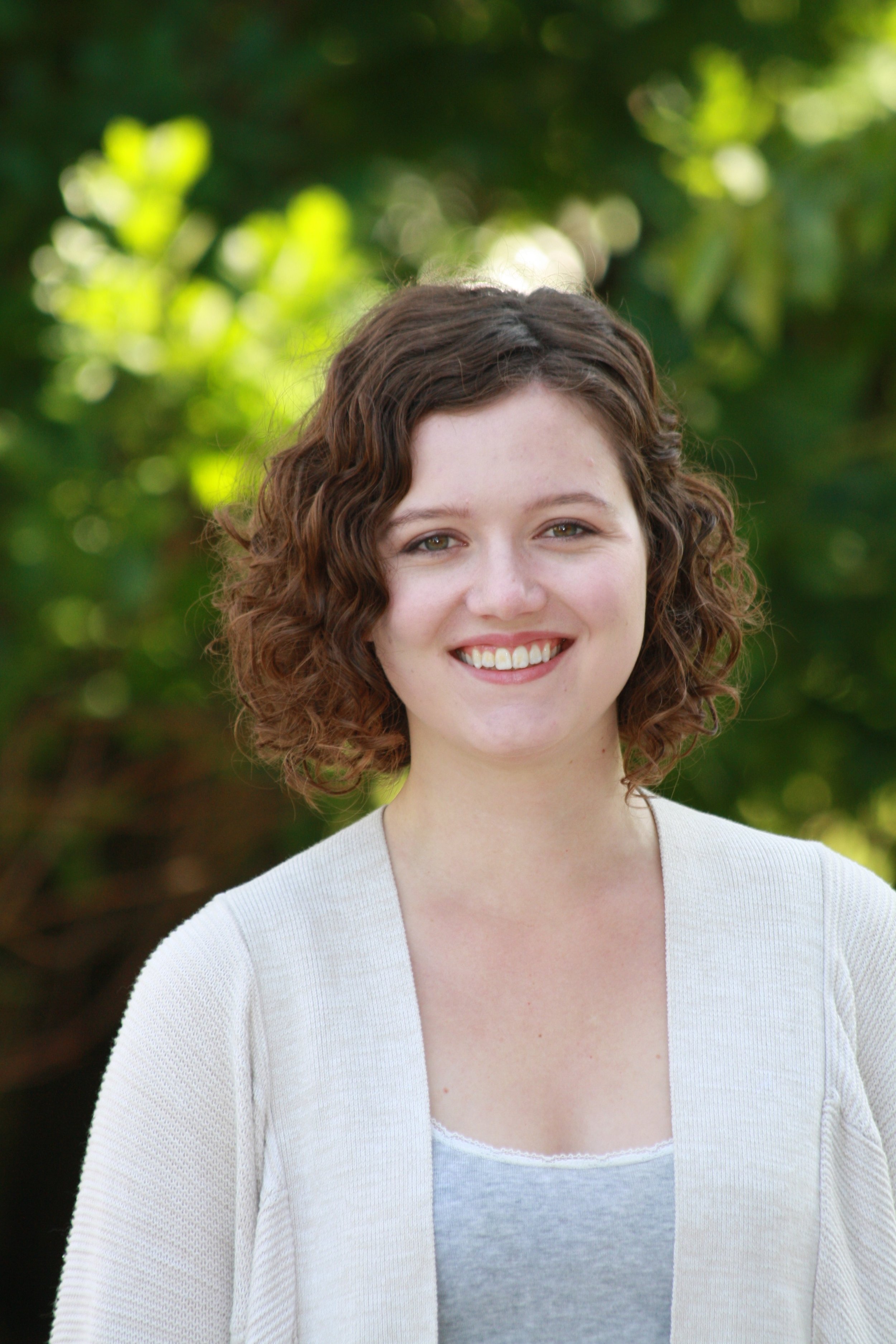 After many long flights, I landed in Arkhangelsk, Russia, to begin a week of learning with the Collaborative Arctic Summer School in Epidemiology (CASE). CASE is a meeting of epidemiology faculty and students from the United States, Canada, Norway, and Russia. It’s a great opportunity to meet with other researchers working in Arctic contexts, and I’m fortunate because this was my second time attending! A few other CASE participants from Alaska had been on my flight from Moscow, and after waiting for the rest of the participants’ flights to arrive, we set off on a 3.5-hour drive to Golubino.
After many long flights, I landed in Arkhangelsk, Russia, to begin a week of learning with the Collaborative Arctic Summer School in Epidemiology (CASE). CASE is a meeting of epidemiology faculty and students from the United States, Canada, Norway, and Russia. It’s a great opportunity to meet with other researchers working in Arctic contexts, and I’m fortunate because this was my second time attending! A few other CASE participants from Alaska had been on my flight from Moscow, and after waiting for the rest of the participants’ flights to arrive, we set off on a 3.5-hour drive to Golubino.
Golubino is a resort along the Pinega River, and it was the beautiful setting of CASE 2017. The food was delicious, and always surprising! Breakfast on the first day included porridge with berries (surprisingly savoury), and small pastries (surprisingly filled with fish). Presentations from faculty and students began almost immediately, and continued throughout the week. Although every presentation focused on Arctic Epidemiology, the populations and outcomes of interest varied widely. We heard about suicide and suicide prevention, cardiovascular disease, perinatal outcomes, and environmental contaminants, among other topics. One presentation that stood out was by Ketil Lenert Hansen from the University of Tromsø- on the topic of “Ethical and methodological Issues in working with Indigenous peoples in the Arctic”, and focused on the Sámi context in Northern Europe. From Ketil’s talk, there seemed to be common themes between issues faced by Sámi and by Indigenous peoples in Canada. Ketil also recommended a film, “Sámi Blood”, which is a dramatized telling of a Sámi girl’s experience growing up in Sweden in the 1930s.
In the evenings, we had time for activities! The first night’s adventure was a walk through the Taiga forest to a holy spring. Some in our group were suffering from stuffy noses, so our tour guide showed us how to use the forest ants as a remedy. There were large anthills made of pine needles along our path, and to help a stuffy nose, you tap your hands three times on the anthill, bring your hands to your face, and inhale. The ants make your hands smell like vinegar, which, we all learned, is very effective at clearing out sinuses.
Tuesday night’s activity was an excursion to the nearby “Golubinsky proval” karst caves. These are limestone caves carved by water, and there are tunnels are over a kilometre long. The temperature inside the caves is much cooler than outside, so the white limestone was coated in ice. Unfortunately, most of the tunnels were flooded, so we couldn’t go very far into the cave. But – what we could see was stunning, and definitely worth getting all dressed up for!
Wednesday night was team-building activities, followed by a campfire, tea tasting, and traditional songs and dances by the river. We heard that the singers, dressed in traditional costume, are all local retirees! Our last night, Thursday, saw us all making “Pinega shanezhki” pies and relaxing after a trip to a monastery. Friday was our long drive back to Arkhangelsk, with a stop at “Malye Korely”, an open-air museum of wooden architecture from the Arkhangelsk Region. From the museum, it was back to Arkhangelsk and the airport – a great end to a great week at CASE!
Congratulations to Carlee and Manpreet
On Friday June 16th, 2017, Carlee Wright and Manpreet Saini received their Master of Science at the University of Guelph Convocation. Congratulations!
The Harper Lab welcomes Teddy to Guelph!
Written by Chloe Zivot, Undergraduate Research Assistant It’s with great pleasure that we welcome Teddy Kisembo to the Harper Lab as she completes a course in EcoHealth at the University of Guelph this summer. While she has only been here one month, her energy and knowledge have brightened the department since her arrival, and we look forward to having her here with us until July!
Teddy has a BA in Urban Planning from Makerere University in Kampala, Uganda, and is currently a Masters student at Makerere University, pursuing a degree in Land Use and Regional Development. Her MA research is centered around the effects that flooding has on the livelihoods and health of urban residents, specifically in regard to the impacts of relocation. Teddy explains that relocation can take many forms, whether it is permanent or seasonal relocation, or relocation on a weekly or nightly basis according to rain patterns. While flooding has serious health and safety impacts on the residents of informal settlements in Kampala, her research suggests that these may not be the primary force behind relocation, nor the primary source of concern for members of these communities. For many, the disruption of day to day social, cultural, and economic activities (which may heavily affect household income, education, and religious life) is considered a larger barrier to well-being than the flooding itself.
In regard to future plans, Teddy has expressed that she is passionate about staying in research. She believes that to do research is to “get into the minds of people, and see what knowledge can come out of that. It’s putting a voice to the people that can speak to policymakers and planners”. Teddy’s work is very interesting and critical in the face of climate change, and we look forward to seeing the direction in which both her current and future research it take her!
The EcoHealth course that Teddy is taking part in here in Guelph is taught by Dr. Harper and other EcoHealth researchers from across Canada. The course teaches innovative approaches to better understanding the complex factors which influence health. (More info is available at http://www.copeh-canada.org/en/key-areas/training-and-capacity-building/course.html). Teddy says she enjoys the multidisciplinary nature of the class and finds the content refreshing, stating that is has re-provoked her interest in land planning. She is enjoying her time in Guelph so far, despite the weather being far cooler than she is accustomed to at home in Uganda!
We are thrilled to have Teddy here in Guelph with us this summer; we look forward to getting to know her better and showing her around Guelph in the upcoming weeks!
Lessons from the Labrador Research Forum: Truth, Respect and Reciprocity, Humility, & (Re)framing Research as (Re)conciliation
Written by Alexandra Sawatzky, PhD Candidate Between April 30 and May 3, Jacquie, Mel, and I were privileged to attend the first biennial Labrador Research Forum in the Upper Lake Melville Region of Labrador. This gathering involved the communities of Happy Valley-Goose Bay, Sheshatshiu First Nation, and North West River, and engaged the three Indigenous nations of this region: the Innu, Nunatsiavut Inuit, as well as NunatuKavut Inuit. Over 150 delegates, including researchers, government representatives, community leaders and organizations, and the broader public came together to engage in dialogue and co-learning surrounding research in the North, by the North, for the North.
The Forum kicked off with an afternoon of cultural activities in Sheshatshiu First Nation, including beading, sewing, and snow shoe making. These activities, together with the opening ceremony at the beautiful Sheshatshui Ussiniun Youth Centre, instilled a strong sense of community among the attendees that set the tone for the rest of the Forum.
This Forum was structured differently to more conventional research gatherings, with presentation sessions containing a 5 minute research outline, followed by a 10-minute discussion with the audience. This led to engaging, dynamic sessions that encouraged deeper dialogue, as well as many opportunities for continued dialogue outside of the session during coffee breaks. As an audience member, I felt there were more opportunities to be an active participant within the session, and more space for deeper listening and engagement with the ideas and topics.
Grounding these ideas and topics were several intellectually and spiritually stimulating plenary panel discussions. The first plenary of the Forum was comprised of a panel of Indigenous leaders from across the region, who discussed their views on research as reconciliation and challenged the conventional understandings of the words “research” and “reconciliation.” These words carry great weight, and we have a responsibility to unpack and understand their connotations in order to use them effectively and with an awareness of their history. This first plenary, and all of the plenaries, presentations, and discussions that followed, emphasized the importance of our distinct contributions to research as reconciliation, which is premised on core values of truth, respect, and humility.
Truth
Starting from a place of truth, we can work towards reconciliation. President Todd Russell of the NunatuKavut Community Council emphasized this point in the first plenary panel, as he explained that pathways toward research as reconciliation must be developed in partnership with Indigenous peoples, partnerships wherein the research community understands its own truth, its own place.
Respect and reciprocity
Practicing respectful partnerships with people, plants, and animals can help move research forward in a good way – towards reconciliation. This idea was explored through a plenary on Caribou and people in Labrador, where the panelists described how hunters should position themselves as caretakers of the animals they choose to hunt, and engage in partnerships with these animals. These types of partnerships are also important in the research community, where there is a long history of researchers viewing people, plants, and animals merely as “subjects of study,” rather than respecting them as partners in research endeavors. Cultivating respectful partnerships requires researchers to position themselves as caretakers of data, as explained by Dr. Margaret Kovach in her keynote address titled: “Indigenous research, Indigenous methodologies, and the power of Indigenous knowledges in informing research practice.” Dr. Kovach went on to say that the word “data” in Latin means gift. The knowledge and stories shared by Indigenous peoples through research partnerships should be understood and accepted as gifts, which connects to the responsibility of all those involved in research to practice and uphold respectful, reciprocal partnerships.
Humility
The importance of cultural humility was also introduced in the “Research as Reconciliation” plenary, and was frequently revisited throughout the Forum. In research, cultural humility involves reflecting on where we are coming from as we enter into research partnerships, and where we hope to go together with that research. Moreover, cultural humility involves coming to the table with an open mind, as well as with the willingness to step back from the table every so often to listen and learn. We must be mindful of the questions we ask, and aware of the words and language we use to ask those questions. We must accept the value of the answers we receive and the lessons we learn from asking those questions – beyond accepting knowledge, we must value that knowledge. In reflecting on these ideas with Mel and Jacquie, Mel noted that she was particularly impacted by President Todd Russell (NunatuKavut Community Council) questioning the term “higher education,” as well as the ways in which we determine who is an “expert.” Jacquie and I felt similarly to Mel in that President Russell’s words reminded us that the research we do involves knowledge systems and worldviews that we have very little understanding and lived experiences of.
(Re)framing research as (re)conciliation
Participants were encouraged to critically reflect on how we frame “research as reconciliation” through unpacking the meaning of each of those terms. Unpacking these terms from a place of truth, respect, and humility is crucial in order to understand the role research has played, and can continue to play, in colonization of Indigenous peoples and lands. The plenaries, keynotes, presentations, and workshops at this Forum encouraged further explorations of the ways in which “research” transcends beyond academia to involve the communities, governments, and environments within which the research takes place. Furthermore, many panelists and presenters reiterated the fact that “reconciliation” needs to be understood as more than just a buzzword. Reconciliation involves action. Part of this action involves coming together as community, through opportunities like this Forum, to discuss and develop pathways toward reconciliation through research. Ultimately, moving towards and along these pathways requires a commitment to cultivating and sustaining relationships premised on truth, respect, and humility.
Got Clams? Anna on CBC!
In case you missed it, here is a story from 2016 about the People, Animals, Water, and Sustenance (PAWS) Project. In this article, MSc Candidate, Anna Manore, describes her data collection in Iqaluit, Nunavut. With over 150 shares on social media, don't miss reading this article! http://www.cbc.ca/news/canada/north/clam-study-iqaluit-1.3767015
Second month in Davis, California!
Written by Anna Manore, MSc Candidate Things have been progressing well in Davis!
In February, I presented mine and People, Animals, Water, and Sustenance (PAWS) project's work at the Northern California Parasitologists’ Spring Meeting at San Francisco State University (SFSU). The meeting was attended by faculty and students, mainly from SFSU, and who seemed to mainly work on Lyme disease. Some of the presentations brought back memories of a PopMed Seminar at the University of Guelph, where some preserved ticks were passed around…
Because the meeting was on the Saturday before Presidents’ Day, I spent the rest of the long weekend (along with a housemate of mine) exploring the city. Riding a cable car, climbing Telegraph Hill, and seeing sea lions on Pier 39 were some highlights of the visit.
I was lucky enough to return to the city the following weekend with a friend from home, and got to explore even more! Biking across the Golden Gate Bridge and a trip to Point Reyes National Seashore were the main activities, and they were both excellent.
In the lab at the University of California, Davis (UC Davis), I’ve been working closely with lab technicians Beatriz and Brittany to make sure everything is ready to start testing the Nunavut clam samples for Cryptosporidium and Giardia. In fact, we tested our first batch of clam samples just last week. Things are progressing well, and there’s still lots of work to be done!
Ugandan Team Meeting: Climate Change and Indigenous Food Systems, Food Security, and Food Safety Project
Written by Jacqueline Middleton, PhD StudentOn February 20th, Ugandan team members of the larger “Climate Change and Indigenous Food Systems, Food Security, and Food Safety” project met at McGill University, in beautiful Montreal, Canada. Principal investigators (PIs), project managers, students, and research assistants (RAs) from the Ugandan research team united to discuss how best to understand and address Indigenous food security in the context of climate change in Uganda.
Over the 3 day workshop, goals and themes were shared, explained, then further carved out as Climate Change IFS3 plans its next steps. Not only were students and RAs invited to these preliminary discussions, we were given the empowering opportunity to share our knowledge, perspectives, and expectations. We were asked what we would like to see come out of Climate Change IFS3 over the next 5 years, not just as students and RAs, but importantly, as team members working with communities to realize meaningful research. On day 2, students and RAs broke off from the larger group to identify our priorities as a diverse network of researchers, and flesh out a presentation for the PIs the following morning. Over the day we discussed a broad range of needs and interests including, fostering cross site connections, equitable training and development opportunities for students and RAs involved in the project, and best practices to support our safety and wellbeing. We discussed how these ideas may be realized including: a mentorship program; skills training and workshops; fieldwork support (e.g. risk assessments, first aid training); and an intranet site to house a metadata repository, experiential blog posts, etc., in an aim to increase communication, transparency, and relationships across all universities and regions involved.
No trip to Montreal would be complete without indulging in its diverse cuisine. Following our day 2 discussions, the entire group reconvened at an authentic Haitian restaurant, Agrikol, whose beautiful décor, and spectacular food, served as a warm escape from the city. With food comas setting in, we headed to bed before our third, and final day together. Students and RAs opened the morning with a presentation, followed by uninterrupted discussion time with PIs and project managers. After tying up some loose ends, our official business was over, and we shared a final lunch, and afternoon activity together. It provided a valuable opportunity to cement the relationships developed over the workshop days with new supervisors, mentors and colleagues.
I am incredibly grateful to have set-off my PhD studies with the Climate Change IFS3 meeting. The opportunity to connect with peers and colleagues is one of my greatest resources as a graduate student. I feel grounded and empowered as I see where my own project and interests fall within Climate Change IFS3, as well as larger international goals for human health. Moreover, I am excited to be moving forward with such a brilliant team of individuals, as we strive for better research and reflexivity as a network.

People and Climate Change: Vulnerability, Adaptation, Social Justice
Sherilee Harper and Shuaib Lwasa were invited speakers at the People and Climate Change: Vulnerability, Adaptation, Social Justice Symposium, at Washington University in St Louis. Here are some select photos courtesy of Center for Social Development at Washington University in St. Louis. https://www.youtube.com/watch?v=ar6_qD4Y9qw#action=share
Clams, Cryptosporidium, and Giardia: First Month in Davis, California
Written by Anna Manore, MSc Candidate After an early flight on Friday the 13th, I felt very lucky to arrive safe and sound in sunny Davis, California! I’m incredibly fortunate to be spending the next few months at UC Davis, working in Dr. Karen Shapiro’s lab to test clam samples from Nunavut for the enteric pathogens Cryptosporidium and Giardia.
My first weekend was spent running errands and settling in. One part of my routine that I could continue was a Saturday morning visit to the Farmer’s Market. Although the atmosphere at the Davis market is like the one in Guelph, the variety of produce is very different. The farmer’s market is right next door to the U.S. Bicycling Hall of Fame – which is well-placed in Davis. The whole city is very bike-friendly, and almost perfectly flat, making it easy to get around on two wheels. The only obstacle to biking is the rain. This winter in Davis has been very rainy, and it’s definitely taken some getting used to!
For the first few weeks in the lab, I’ve been learning a lot by shadowing Beatriz, the lab technician. She’s been so great and has been teach me the lab methods I’ll be using. I’ve also been working to compare different gel dyes so I can compare my results to ones that I get in Guelph. The work I’ve been doing is helping to lay the groundwork before I begin testing my clam samples, which will hopefully happen soon!
My first California adventure was a short weekend trip to Monterey and the Monterey Bay Aquarium. Seeing otters and sea lions right from the beach was a highlight of my trip so far!
Undergraduate Summer Job Opportunities!
 Want to work in an interdisciplinary, intersectoral team? Want to learn about and research climate change and health impacts?
Want to work in an interdisciplinary, intersectoral team? Want to learn about and research climate change and health impacts?
Apply now!
Click here to see the job posting.
Students Share Their EcoHealth Research at the OVC Graduate Research Symposium
Written by Anna Manore, MSc Candidate
On November 16th, students from the Harper Lab showcased their work at the OVC Graduate Student Research Symposium through posters and oral presentations. Students Danielle Julien and Anna Manore took home the 1st place prizes in the PhD and MSc poster competitions, respectively.
See student posters here!
Canadian Network for Maternal, Newborn and Child Health Conference: Adolescents identified as a priority population
Written by Kaitlin Patterson, PhD Candidate
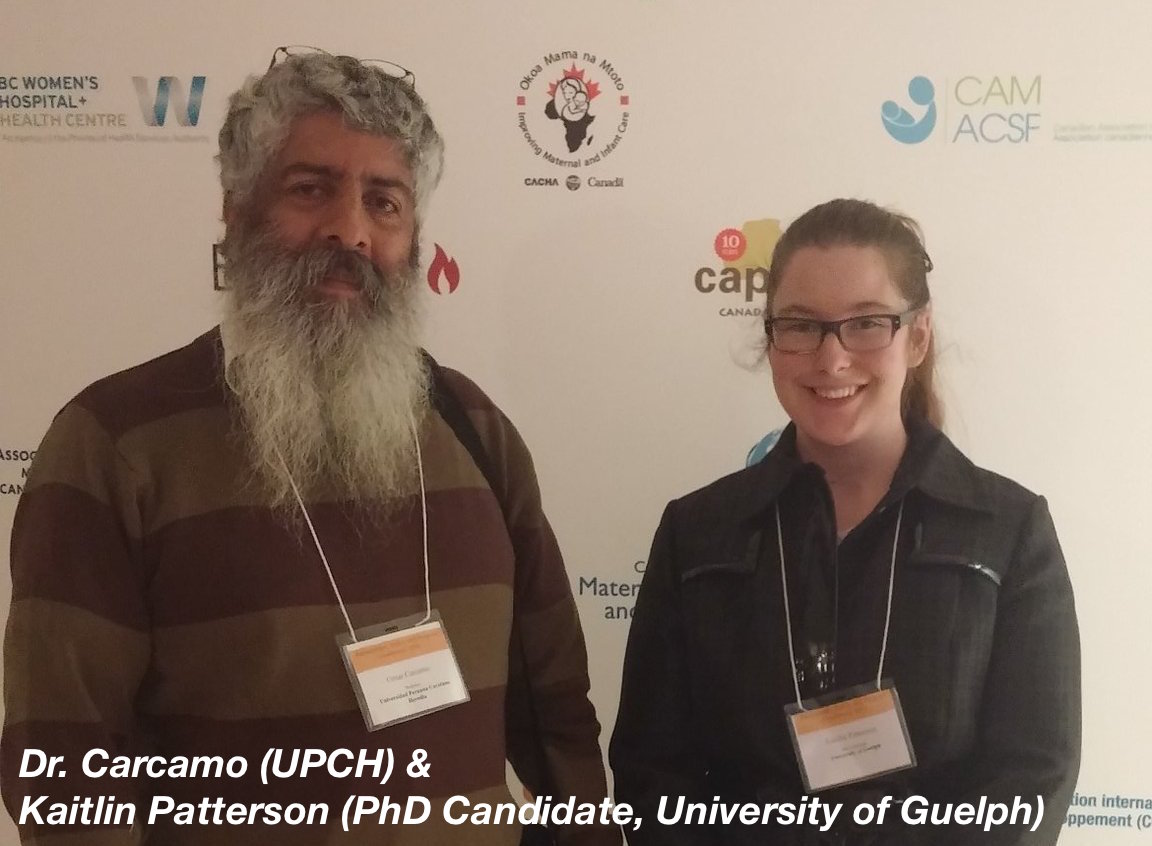 This week I attended the Canadian Network for Maternal, Newborn and Child Health Conference in Montreal. The focus of the panels and discussions was the 3 Ps: Partnerships, Policy, and Progress. Discussions ranged from how and which policies can support the achievement of the sustainable development goals (in particular those related to maternal and child health, and gender equality), successes and lessons learned in programming and partnerships, and pathways for the future. I was also delighted to run into an IHACC and CCIFS3 collaborator Dr. Cesar Carcamo from the Universidad Peruana Cayetano Heredia. It was really great to connect with him and take a token IHACC pic!
This week I attended the Canadian Network for Maternal, Newborn and Child Health Conference in Montreal. The focus of the panels and discussions was the 3 Ps: Partnerships, Policy, and Progress. Discussions ranged from how and which policies can support the achievement of the sustainable development goals (in particular those related to maternal and child health, and gender equality), successes and lessons learned in programming and partnerships, and pathways for the future. I was also delighted to run into an IHACC and CCIFS3 collaborator Dr. Cesar Carcamo from the Universidad Peruana Cayetano Heredia. It was really great to connect with him and take a token IHACC pic!
Two key themes stood out/impacted me most. The first was the neglect to identify adolescents as a priority population in many of the global health priorities and targets. Maternal mortality is the highest cause of death among adolescent girls. They have the least amount of education, money, health services or access to contraception, further exacerbated by the continuation and propagation of child marriage, and the highest rates of HIV acquisition in Africa. The second theme closely linked with the first was the need to ensure sexual reproductive rights including access to safe abortions and post abortion care, contraception/family planning, feminine hygiene products, and putting an end to child marriage.
A refreshing aspect of this conference was that it was not self congratulatory. The speakers and panelists were not self-deprecating, but they were critically reflexive. They openly discussed how as a global community we are failing women. We have not decided that women’s lives are worth saving. We need to be better. It was an impassioned call and a resolve to meet these global challenges.
Nyaradazayi Gumbonzvanda (Goodwill Ambassador of the African Union Campaign to End Child Marriage & World YWCA General Secretary) ended the conference with a poignant reminder for anyone doing research or working with communities, “[y]ou are not going to the field. You are going to someone’s home, the totality of their world”.

